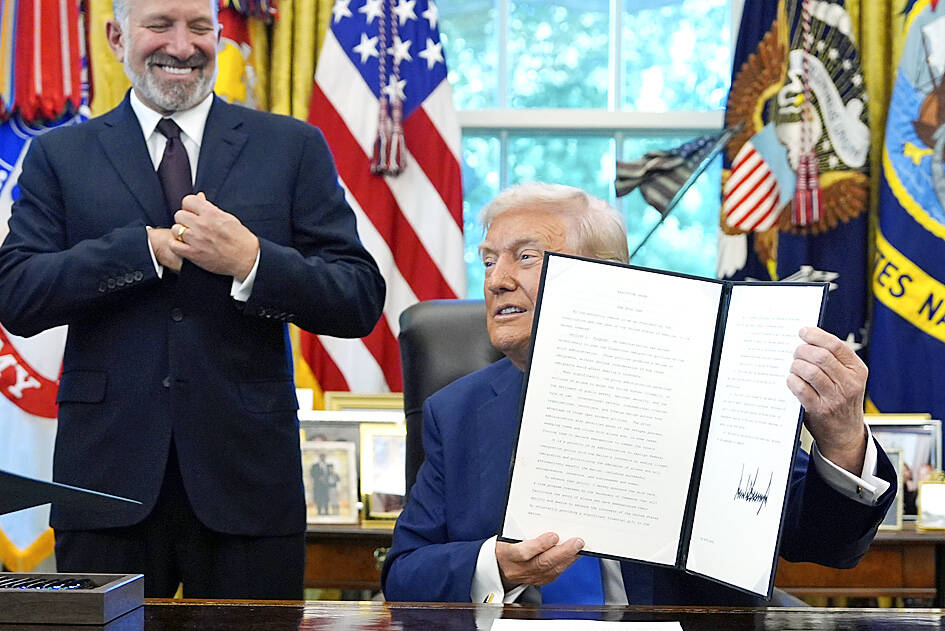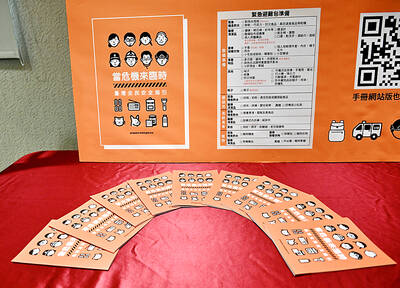India’s leading trade body yesterday said it was concerned by a new annual US$100,000 fee that US President Donald Trump ordered for H-1B skilled worker visas, an addition that could have major repercussions for the tech industry, where such permits are widespread.
The new measure, which would likely face legal challenges, was announced yesterday alongside the introduction of a US$1 million “gold card” residency program that Trump had previewed months earlier.
“The main thing is, we’re going to have great people coming in, and they’re going to be paying,” Trump told reporters as he signed the orders in the Oval Office.

Photo: AP
H-1B visas allow companies to sponsor foreign workers with specialized skills — such as scientists, engineers and computer programmers — to work in the US, initially for three years, but extendable to six.
The US awards 85,000 H-1B visas per year on a lottery system, with India accounting for about three-quarters of the recipients.
India’s top trade body Nasscom said that technology companies would be hit, because “business continuity will be disrupted for onshore projects.”
It was also concerned by the short timeline, with the new fees under Trump’s order coming into effect today.
“A one-day deadline creates considerable uncertainty for businesses, professionals, and students across the world,” Nasscom said. “Policy changes of this scale are best introduced with adequate transition periods, allowing organizations and individuals to plan effectively and minimize disruption.”
Large technology firms rely on Indian workers who either relocate to the US or come and go between the two countries.
Tech entrepreneurs have warned against targeting H-1B visas, saying that the US does not have enough homegrown talent to fill important tech sector job vacancies.
However, US Secretary of Commerce Howard Lutnick said: “All the big companies are on board.”
The number of H-1B visa applications has risen sharply in recent years, with a peak in approvals in 2022 under then-US president Joe Biden.
In contrast, the peak in rejections was recorded in 2018, during Trump’s first term.
The US approved about 400,000 H-1B visas last year, two-thirds of which were renewals.
Trump on Friday also signed an order creating a new expedited pathway to US residency for people who pay US$1 million, or for corporate sponsors to pay US$2 million.
Meanwhile South Korea’s Ministry of Foreign Affairs yesterday said officials would “comprehensively assess the impact of these measures on the advancement of [South Korean] companies and professional talents into the US market and engage in necessary communication with the US.”

One of two tropical depressions that formed off Taiwan yesterday morning could turn into a moderate typhoon by the weekend, the Central Weather Administration (CWA) said yesterday. Tropical Depression No. 21 formed at 8am about 1,850km off the southeast coast, CWA forecaster Lee Meng-hsuan (李孟軒) said. The weather system is expected to move northwest as it builds momentum, possibly intensifying this weekend into a typhoon, which would be called Mitag, Lee said. The radius of the storm is expected to reach almost 200km, she said. It is forecast to approach the southeast of Taiwan on Monday next week and pass through the Bashi Channel

NO CHANGE: The TRA makes clear that the US does not consider the status of Taiwan to have been determined by WWII-era documents, a former AIT deputy director said The American Institute in Taiwan’s (AIT) comments that World War-II era documents do not determine Taiwan’s political status accurately conveyed the US’ stance, the US Department of State said. An AIT spokesperson on Saturday said that a Chinese official mischaracterized World War II-era documents as stating that Taiwan was ceded to the China. The remarks from the US’ de facto embassy in Taiwan drew criticism from the Ma Ying-jeou Foundation, whose director said the comments put Taiwan in danger. The Chinese-language United Daily News yesterday reported that a US State Department spokesperson confirmed the AIT’s position. They added that the US would continue to

The number of Chinese spouses applying for dependent residency as well as long-term residency in Taiwan has decreased, the Mainland Affairs Council said yesterday, adding that the reduction of Chinese spouses staying or living in Taiwan is only one facet reflecting the general decrease in the number of people willing to get married in Taiwan. The number of Chinese spouses applying for dependent residency last year was 7,123, down by 2,931, or 29.15 percent, from the previous year. The same census showed that the number of Chinese spouses applying for long-term residency and receiving approval last year stood at 2,973, down 1,520,

EASING ANXIETY: The new guide includes a section encouraging people to discuss the threat of war with their children and teach them how to recognize disinformation The Ministry of National Defense’s All-Out Defense Mobilization Agency yesterday released its updated civil defense handbook, which defines the types of potential military aggression by an “enemy state” and self-protection tips in such scenarios. The agency has released three editions of the handbook since 2022, covering information from the preparation of go-bags to survival tips during natural disasters and war. Compared with the previous edition, released in 2023, the latest version has a clearer focus on wartime scenarios. It includes a section outlining six types of potential military threats Taiwan could face, including destruction of critical infrastructure and most undersea cables, resulting in